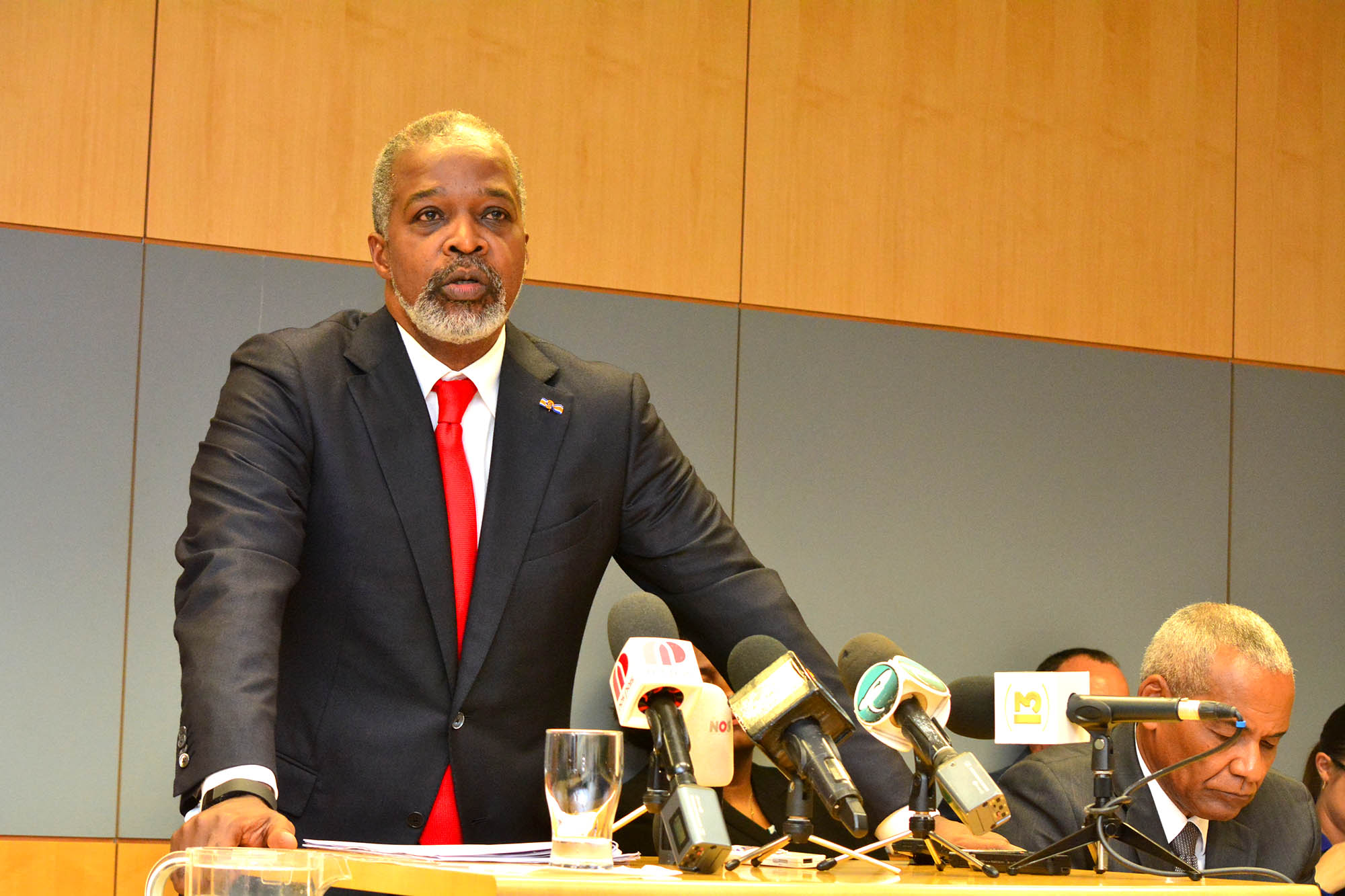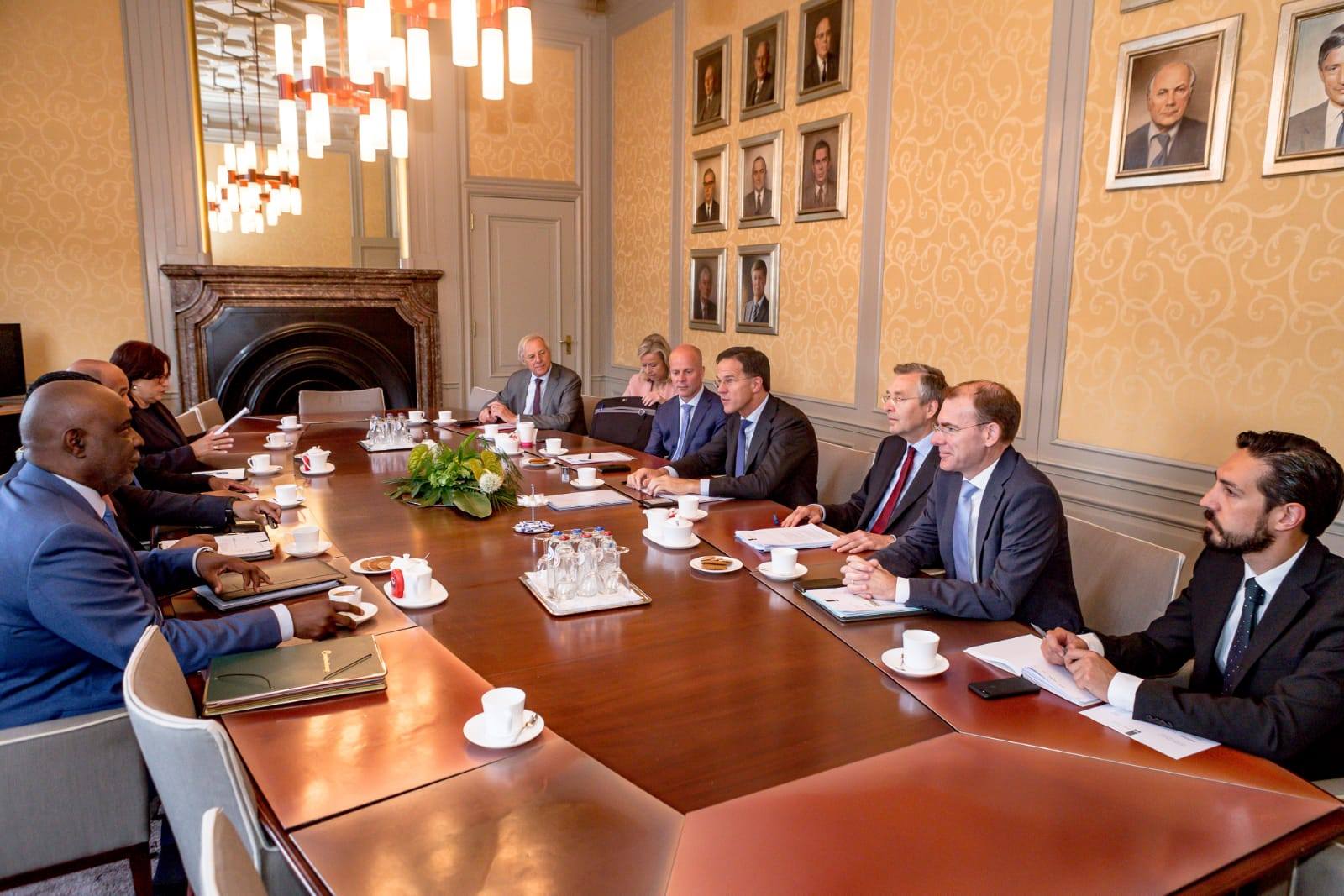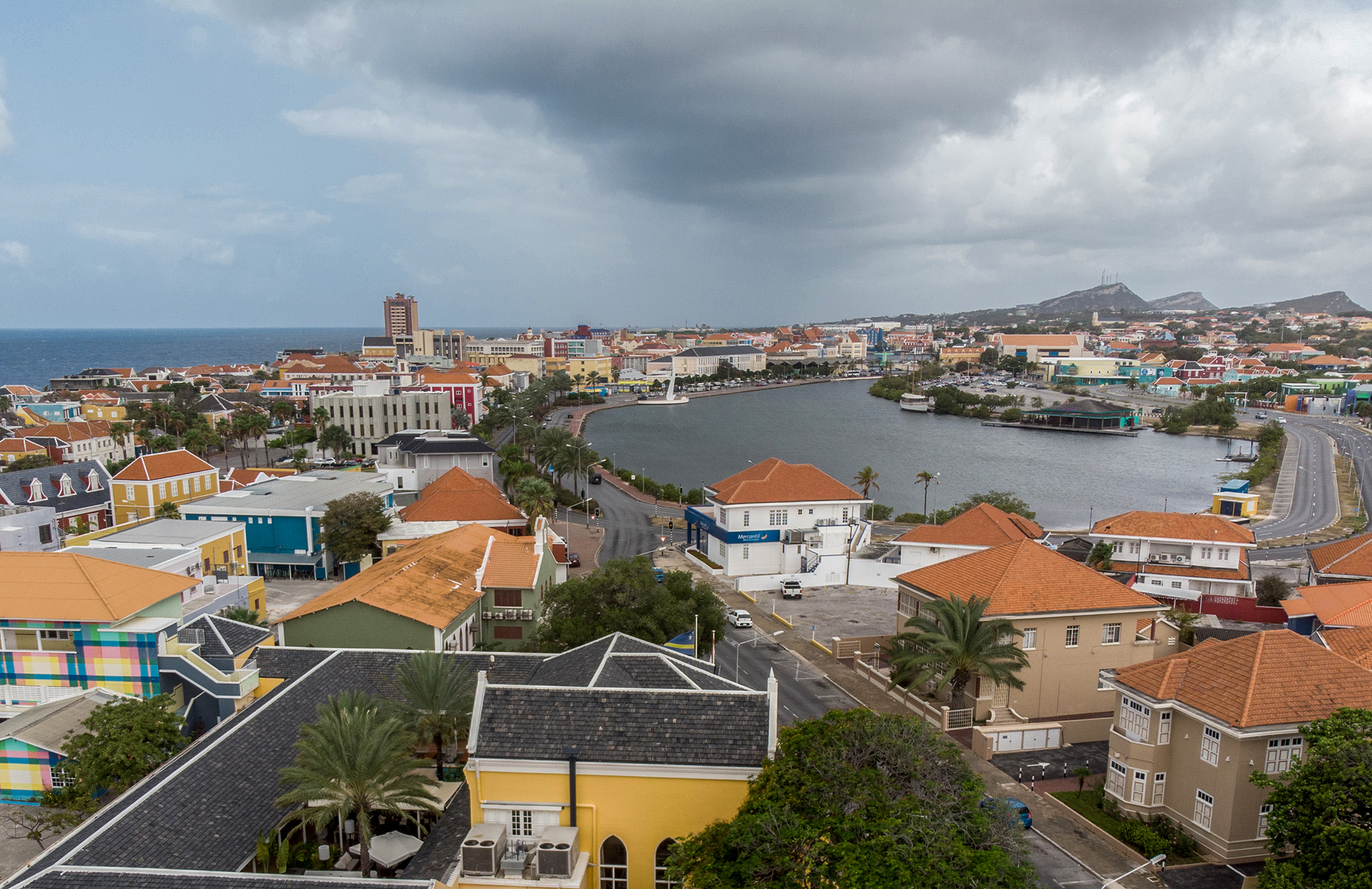By dr. Emsley D. Tromp
This note is written against the background of the turbulent times we are living through. I hope to convince the readers that despite the dark clouds covering our islands, a concerted effort by everyone will certainly put us back on the road to prosperity for all of us.  The economic crisis we have been facing during the last few years should not have come as a surprise. It is, to a major extent, the result of capricious policymaking, lack of oversight by parliament, and what was meant to be a tool to promote fiscal soundness turned out to be a weaponization of an economic tool.
The economic crisis we have been facing during the last few years should not have come as a surprise. It is, to a major extent, the result of capricious policymaking, lack of oversight by parliament, and what was meant to be a tool to promote fiscal soundness turned out to be a weaponization of an economic tool.
We have to acknowledge that the economic ills besetting our island are of our own making. But our economic problems cannot be analyzed without putting them against the background of the policies advanced by the Dutch government - proponents of this policy are, among others, members of the Dutch parliament Van Raak and Bosman - policies that purport to promote sound public finance through the CFT (College financieel toezicht) on the one hand, and good governance on the other hand.
The Rijkswet financieel toezicht (Rft) and its constituent instrument, the CFT with their rigid imposition of the budget rules and their consequent measures, have created a state of constant polarization both among our policymakers, as well as between our policymakers and Dutch Government. The budgetary norms enshrined in the Rft, in fact constitute a set of perverse incentives that have rendered sound macroeconomic policymaking irrelevant. Sound macroeconomic policy since 10-10-‘10 has come to be defined as meeting Cft demands (based on the norms enshrined in the Rft) to avoid an instruction from the Kingdom Council of Ministers (RMR). Hence, since 10-10-‘10, all macroeconomic policies pursued by Curaçao government have been seen or been justified as ‘necessary to meet Cft demands’. Meeting Cft demands has become a goal in itself and thus gradually transformed from a ‘necessary’ to a ‘sufficient’ condition. Policy disputes with Cft are being solved by yielding to Dutch pressure.
That may calm tension (with RMR), but at an intolerably high price: a stagnant economy, high unemployment, and increased poverty.
Mentioned ‘Dutch pressure’ is being reinforced by the policies pursued by the Dutch government to promote good governance through increased funding for RST, TBO, and OM, which are tantamount to psychological coercion. The game plan came to be seen as: ‘Show me the man and I will find the crime’. This policy perhaps represents the gravest threat to our autonomy. In order not to be seen as a rival or as not acting according to the expressed wishes of Holland, people have preferred inaction (i.e., paralysis) to following their own best judgment.
To challenge that inaction is potentially to face the wrath of the Public Prosecutor.
The foregoing, however, begs the following questions: Why does Holland believe that it has the ‘God-given right to interfere in our internal affairs’? Does Holland have an ulterior motive to erode our autonomy? On the surface, Holland’s political rhetoric and public disclosures seem to contradict its ultimate actions. While Dutch politicians constantly advocate revisiting the current constitutional arrangements, the government/civil servants are continually tightening their grip on the internal affairs of the island. Now we can see the force that Holland can project by a mere threat to give Curaçao an instruction if it is unconstrained. It is appalling to see this informal pressure being brought to bear by the Dutch government on virtually every single aspect of the Antillean governments.
The answers to these questions are a tangled web of historical facts, the overriding ones being the debt relief program and the judicial policy to promote good governance. While I am still a proponent of those programs, I believe that the unfettered implementation of those programs without parliamentary oversight created a set of perverse incentives that render our policy makers powerless vis-à-vis their Dutch counterparts. Besides, the rigidities of the Rft leave little room for an autonomous fiscal policy (suis generis).
The making of our economic crisis In 2005, an exuberant Antillean delegation returned from Holland after signing the so-called ‘Slotverklaring’. What they did not realize was that with that tactical victory, they had ceded the long-term strategic advantage of being the master of our own destiny. This concession led to a serious erosion of our autonomy, which only now is becoming evident. This ‘consensus agreement’ created a rootless political elite (Cft) that feels closer to The Hague than to the people of Curaçao, Sint Maarten or the BES islands. This outcome is reminiscent of what has happened with many other unequal treaties forced upon overseas territory by foreign powers.
In 2005, an exuberant Antillean delegation returned from Holland after signing the so-called ‘Slotverklaring’. What they did not realize was that with that tactical victory, they had ceded the long-term strategic advantage of being the master of our own destiny. This concession led to a serious erosion of our autonomy, which only now is becoming evident. This ‘consensus agreement’ created a rootless political elite (Cft) that feels closer to The Hague than to the people of Curaçao, Sint Maarten or the BES islands. This outcome is reminiscent of what has happened with many other unequal treaties forced upon overseas territory by foreign powers.
As I have mentioned on previous occasions, as a consequence of this agreement and subsequent legislation, policy successes are now being defined as getting a passing grade from Cft. Little to no attention is being paid to the social-economic situation of the inhabitants of Curaçao and Sint Maarten. This all, at the expense of the social and economic situation.
With a floundering economy and a fractured political landscape, we are risking a total social collapse. All the gains that we made with the structural reforms in the healthcare, labor, and pension systems that are fundamental to our further development are now at risk.
The question becomes: does this risk outweigh the overriding goals of the consensus agreement? Does the fact that Holland provided us with a debt relief endow them with the right to erode our autonomy? Or was the break-up of the Netherlands Antilles a well-conceived geopolitical strategy of Holland in order to own the individual parts (the reverse Pottery Barn rule; the Pottery Barn rule is an American expression alluding to a ‘you break it, you buy it’ policy, by which a retail store holds a customer responsible for damage done to merchandise on display).
To me, this notion of debt-induced autonomy erosion and Holland’s current judicial philosophy toward the post 10-10-‘10 Netherlands Antilles is at the root of our economic ills. As mentioned, they have led to polarization and paralysis. In 2005, I advanced the notion of a comprehensive solution of the debt problem of the Netherlands Antilles in the context of the first Millennium Development Goal (MDG). I regret to note, however, that through the Rft, Holland seems to be promoting a policy that runs counter to the principles on which the debt relief was premised, namely, reduction of extreme poverty (‘Toward a comprehensive solution of the debt problem of the Netherlands Antilles’ November 12, 2005. Dr. E. D. Tromp, pp 91-96 in Ensuring Stability). I contended that given the structural problem that the newly formed countries would be facing, it was imperative they be given a starting position that would allow them to realize the hope and aspirations of their inhabitants. This assertion was based on the notion that if the then-existing outstanding public debt was distributed among the five islands, then their debt-to-GDP ratio would be prohibitively high, crowding out their future investment and economic growth.
To make matters worse, this arrangement (Cft) masked another serious problem that came to be known as the ‘Economic Cliff’. Since 2012, the Central Bank has been warning policymakers in the Monetary Union that if no appropriate policy measures are put in place, the dynamic of the existing policies will push the Union onto an economic precipice. The Centrale Bank contended that the confluence of a series of events in 2019 (below) would likely lead to a sharp drop in the GDP of the respective countries of the Monetary Union - similar to what occurred in the 1980s with the partial termination of the double taxation treaty with the United States, the departure of Shell and Exxon as operators of the refineries in Curaçao and Aruba, respectively, the malaise of the transportation industry, and the collapse of Venezuelan shopping tourism.
As I have warned, multiple events occur this year: (1) The grandfather clause in the offshore tax legislation will expire; (2) The lease agreement with PdVSA as the operator of the oil refinery in Curaçao will expire; (3) Curaçao and Sint Maarten will become net payers to Holland as the public outstanding debts of both countries to Holland begin to mature - this implies a net outflow of foreign exchange to Holland, bringing its pressure to bear on an already large current account deficit of the balance of payments; (4) What was not foreseen then is the rapidly deteriorating situation in Venezuela; and (5) the recent passing of Hurricane Irma with its devastating consequences for the tourist infrastructure of Sint Maarten - the main generator of foreign exchange for the monetary union - is negatively impacting GDP.
As noted, due to gross negligence of our policymakers and unfettered meddling by the Dutch government, those warnings went unheeded. The result of the crippling developments on our economy is the crisis we now face.
Despite the foregoing, Holland seems determined to push us onto the economic precipice with the recently announced threat of a Kingdom Instruction. Thanks to the public outcry, now they seek dialogue and consultation.
In a recently issued Concluding Statement, the IMF also reminded us of the sorry state of our economy: rising unemployment, contracting economic activities, weak public finances, large external current account deficit, and rising poverty. The IMF joined the chorus of voices warning the government that the blind implementation of the Cft’s recommendations may further aggravate the state of our economy. I quote: ,,In staff’s view, consistent implementation of quality measures is more important for reaching medium-term sustainability than the speed of adjustment”. Yet despite that warning, Holland seems determined to put us on the path of self-destruction.
The question becomes: What went wrong? Why did policymakers not heed the warning of the Central Bank? To answer this question, I will reflect both as a private citizen and as a former President of the Central Bank where I was privileged to some insight and information about our economy and the inner workings of our institutions.
The root cause of our economic ills As mentioned, Holland is now prepared to unleash a legal arsenal to protect its interest and is willing to deploy new weapons that exploit its role as Chairman of the Kingdom government. While this may be seductive to some, it is eroding the Kingdom most valuable asset - its legitimacy. The current judicial policy pursued by the Public Prosecutor came to be perceived as a political instrument of the Dutch government to achieve the goals it could not achieve through normal policy dialogue with the Curaçao government. In addition, the Cft syndrome of meeting the budgetary rules created a class of policymakers whose sole objectives became meeting the Cft’s demand as expounded by the Rft. As a consequence of these two developments, we have created a state of paralysis and polarization in policymaking, the consequences of which are now becoming abundantly clear.
As mentioned, Holland is now prepared to unleash a legal arsenal to protect its interest and is willing to deploy new weapons that exploit its role as Chairman of the Kingdom government. While this may be seductive to some, it is eroding the Kingdom most valuable asset - its legitimacy. The current judicial policy pursued by the Public Prosecutor came to be perceived as a political instrument of the Dutch government to achieve the goals it could not achieve through normal policy dialogue with the Curaçao government. In addition, the Cft syndrome of meeting the budgetary rules created a class of policymakers whose sole objectives became meeting the Cft’s demand as expounded by the Rft. As a consequence of these two developments, we have created a state of paralysis and polarization in policymaking, the consequences of which are now becoming abundantly clear.
The IMF staff also stated that ,,the large current account deficit in Curaçao is a significant vulnerability and requires urgent attention”. They went on saying that ,,it is very important to follow through on economy-wide structural reforms to support potential growth and increase exports”.
A closer look at their projections, however, indicates that even in the baseline scenario (incorporating the implementation of the authorities’ announced measures: short-term tax increases, hiring and wage freezes, early retirement package, and savings in the health area), economic growth will remain at an average annual rate of 0.3% for the next five years. During the same period, unemployment will remain in double digits. That is to say, despite all the sacrifices being asked of the public, social and economic progress will remain elusive at best.
Gross debt-to-GDP is projected to hit 62% by 2024, whereas tax revenue-to-GDP will average more than 43%, and debt service-to-revenue will average 3.6%. This 3.6% masks an important downside risk. Curaçao now has access to the Dutch financial market through the Dutch government. As a consequence, the interest rates paid on securities issued by the Curaçao government are equal to those paid by the Dutch government as long as the Rft is in force. In addition, the interest rates paid are at a historical low. A change in any of those two parameters will have far reaching consequences for the sustainability of the fiscal position. Gross official reserves, excluding gold, will continue on a downward path pushing gross official reserves in months of imports from 5.1 months in 2016 to a projected 2.0 months by 2024.
Despite warnings, policymakers have erred on the side of meeting the Cft demands. Now that all the chickens have come home to roost, the question remains: what went wrong? Why do our policymakers seem unresponsive to the public pressure and warnings given to them? Is it due to forecasting errors? Or due to political manipulation? On the other hand, is the Cft deliberately being cautious for fear of breaking the rules? The political appetite to address this seems nonexistent. Though the government has given lip service to this ‘Cft bias’, it seems keener to balance the books.
Another cause of our problem may lie in the elimination of the two layers of government, and hence, the two-year election cycles. Those two-year cycles of elections provided a mid-term evaluation of the policies pursued by the government in power. The elimination of this two-year election cycle created a vacuum. In this vacuum, government coalitions seem to be more stable and less prone to be in tune with their electorate. In their political calculations, the government may perceive that meeting Cft demands is politically more expeditious than responding to the public pressure.
This vacuum left by the constitutional restructuring is now being filled by The Hague through the Cft and its judicial policy. But as is becoming abundantly clear, this policy, which has led to polarization and paralysis, is the root cause of our economic problem.
Dr. Emsley D. Tromp werkte ruim een kwart eeuw bij de Centrale Bank, waarvan het laatste decennium en langer als president-directeur.





